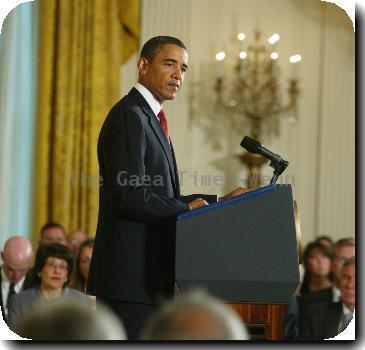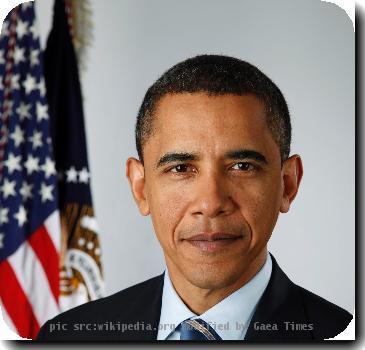In Ohio and around nation, economic woes threaten Democrats’ congressional majorities
By Liz Sidoti, APSaturday, September 4, 2010
Dems’ prospects threatened by economic woes
COLUMBUS, Ohio — Frustrated, discouraged and just plain mad, a lot of people who have lost jobs — or know someone who has — now want to see the names of Democrats on pink slips. And that’s jeopardizing the party’s chances in Ohio and all across the country in November’s elections.
In this big swing-voting state alone, Democratic Gov. Ted Strickland is in a dogfight for re-election. Senate candidate Lee Fisher may be even worse off. As many as six House Democrats could lose their jobs this fall. Recession-fueled animosity is dominating every race, giving Republicans hope of huge victories.
In Ohio, like almost everywhere else, voters don’t much care for Washington, Wall Street or anything resembling the establishment. They grouse about every politician, including President Barack Obama, whom Ohioans played a critical role in electing. They fume over the nation’s teetering finances.
“I don’t think we’ve seen the worst of it yet,” says Jarrod Davis, 26, a Republican. Adds independent Dan Sharpe, 41: “So far, nothing’s gotten better under the Democrats.”
Both of these construction workers backed Obama and his party before, but they say Democrats can’t count on their support again — if they even vote.
At stake nationally is the balance of power in Washington, the tone for the remainder of Obama’s first term and his likely 2012 re-election bid. All 435 House seats as well as 37 Senate seats are on the ballot. The country also will elect 37 governors in races that will determine who oversees the once-a-decade redrawing of political districts.
Republicans are hoping to capitalize on voters’ economic disillusionment, frustration with Obama and tea party-generated enthusiasm.
Democrats are relying on a financial advantage, a robust get-out-the-vote operation and, mostly, the ghost of George W. Bush to curb an expected Nov. 2 shellacking.
“My opponent had both hands on the wheel as he and President Bush drove this economy into the ditch,” says Fisher, a former lieutenant governor trying desperately to overcome a strong and well-funded challenge by Republican Rob Portman, an ex-congressman who was a Bush budget director and trade representative.
In Ohio and elsewhere, the party that won control of Congress and the White House in the past two elections is facing the real possibility of losing power. Not that Ohio Democrats will acknowledge their dismal prospects with eight weeks to Election Day.
“The mood of the public is fluid,” Strickland argues. “I don’t believe this is going to be a terrible year for Democrats. That verdict has not yet been reached.”
True, but Ohio Democrats preside over a volatile electorate angered by a 10.3 percent unemployment rate, above the national average, and there’s no doubt that the economy — and Obama’s policies — is driving the fury of Ohioans and shaping races.
Just blocks from a middle-class backyard where Obama recently insisted “we’re on the right track,” voters take issue with that notion.
“It’s the same old, same old rhetoric,” says Kelli Natale, as she walks her dog, Thor. The 25-year-old college graduate spent two years looking for work before being hired for $12 an hour at an organic certifying company. She’s doubtful about an improvement in the economy.
Natale, who calls herself a left-leaning independent, was one of the legions of young people who enthusiastically embraced Obama in 2008 and who Democrats hope will turn out in November.
So who will she vote for? She pauses to think before saying, “I’m not sure.”
Nearby at Suzzie’s Beechwold Diner, Steve Reither epitomizes the Democrats’ other big challenge: a fired-up electorate tilting toward the GOP.
A Republican-turned-independent, Reither is sick of both parties and says: “They all talk about change and nothing changes.” But he saves his harshest words for Obama, whom he calls a socialist and a liar. This year, he says he’ll probably vote largely with the GOP in November — “I’ll hold my nose” — simply to fire Democrats.
“This administration and his cronies are running this country into the ground,” Reither, 55, says as he finishes his breakfast. The owner of a small auto restoration business, he says he’s been struggling for the past two years, and he blames Obama’s policies that “hurt the little guy.”
It’s no wonder that jobs — who can create them, who is to blame for the losses — are nearly all that candidates here discuss.
Democrats at all levels are sounding a populist tone, casting their races as helping voters on Main Street vs. Republican policies intended to help Wall Street. Republicans, in turn, argue that Democrats — led by Obama — are making a tough economic situation worse with a free-spending, big-government agenda.
In Ohio, Democrats privately concede that three freshmen House Democrats — they were elected in perennial battlegrounds on Obama’s coattails in 2008 and largely supported his agenda while in office — are all but certain to lose. They are Steve Driehaus near Cincinnati, John Boccieri near Youngstown and Mary Jo Kilroy in the Columbus area district that includes Ohio State University.
Republicans also could topple three others who were elected in the 2006 Democratic takeover of Congress — Betty Sutton near Akron, Zack Space in rural east-central Ohio and Charlie Wilson, who represents conservative Ohio River counties in the southeast.
Races for governor and the Senate seat left open by retiring Republican George Voinovich are more competitive.
Strickland, a moderate former congressman who was endorsed by the National Rifle Association, is seeking a second term. His chief opponent may turn out to be the state’s double-digit unemployment rate.
“Things are hard, but they’re not hopeless and we’re on the right track in Ohio,” he insists.
On defense, Strickland paints Republican challenger John Kasich as a handmaiden for Wall Street who is espousing “irresponsible” tax initiatives and supported the outsourcing of Ohio jobs. Says Strickland: “Kasich represents policies that got us into this situation. He and Wall Street culture led us into this recession.”
Kasich, a former House Budget Committee chairman who spent nearly two decades in Washington as a congressman before hosting a Fox News talk show, worked eight years for the now-failed Lehman Brothers investment bank.
In TV ads, the Republican accuses Strickland of running a negative campaign and losing 400,000 jobs on his watch. Kasich claims he has a record of balancing budgets and creating jobs, and says in a new ad that he’s “committed to smaller, more effective, more efficient government, letting people have more money in their pocket.”
In the Senate race, Fisher is trying to capitalize on voter anger at Washington insiders, painting the race as “between someone who is on the ground in Ohio working to save and create jobs and someone who has spent his life in Washington, D.C., promoting and writing policies and laws that have put American workers out of work and have sent our jobs to places like Shanghai.”
With a significant financial advantage over Fisher, Portman exuded confidence as he toured a small business recently in southern Ohio and focused on voter angst.
“People are frustrated because they don’t see Columbus and Washington solving their problems,” he says. Neither capital, he adds, seems to be focused on job growth. He bats away Democratic efforts to link him to Bush, saying: “I’m not asking voters to look back. I’m looking forward.”
To the Democrats’ chagrin, Ohioans — and Americans in general — may be, too.
Online:
Ohio Democratic Party: ohiodems.org/
Ohio Republican Party: www.ohiogop.org/
Tags: Barack Obama, Columbus, District Of Columbia, Events, General Elections, Labor Economy, North America, Ohio, Political Organizations, Political Parties, Recessions And Depressions, Senate Elections, State Elections, United States, United States General Election







